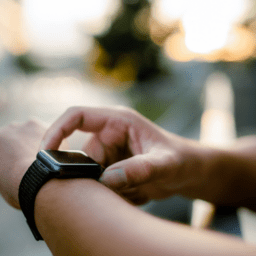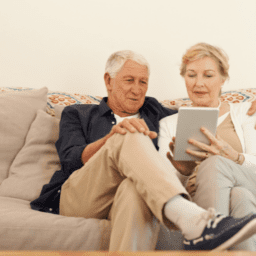If you live in a remote or rural area, it’s no surprise to you that it can be difficult to access care from providers who are true Parkinson’s experts. In fact, since nearly 80 percent of rural areas are considered “medically underserved” in the US, living in a rural area can make accessing any care at all difficult.
Add to that the fact that living in a remote area may also limit your access to grocery stores, gyms, exercise classes, public transportation, and high-speed internet service, and it can be a tall order to get everything in place to live well with Parkinson’s. But it is possible. Here are ten tips on how to do it:
1. If feasible, Consider telehealth options
Even if you live in a remote location, telehealth services from a movement disorder specialist or other Parkinson’s experts may be available. Usually, telehealth appointments are an option so long as, at the time of your appointment, you are in a state where the provider has a license to practice medicine. Though, not every specialist is open to providing care in that way. If high-speed internet service is limited in your area, consider satellite-based options. Also, consider whether you can use your cellular phone’s data connection to have telehealth video visits. A care provider may also be open to speaking with you on the phone.
You can find lists of movement disorder centers here and here, and you can search for an independent movement disorders specialist at the Movement Disorders Society website. Note that these resources are not comprehensive, so check with a local neurologist’s office or a state health department for information specific to your area.
2. Plan ahead for your prescription refills
Submit your prescription refill requests as early as possible to avoid missed doses. Many local pharmacies don’t stock all Parkinson’s medications, and the further you are from a major metropolitan area, the longer it can be for some medications to arrive. Consider automatic home delivery if your health insurance plan allows it. The last thing you need to do is to drive 30 minutes to your nearest pharmacy and learn they don’t have your medication in stock! We know one woman who timed her medication refills with a neighbor who offered to pick them up for her when she went to pick up her own!
3. Educate yourself About Parkinson’s
You may have a solid understanding of Parkinson’s, but if your local care providers are not Parkinson’s experts, it is especially important that you develop a broad base of knowledge about Parkinson’s treatments and other aspects of care. You can do this using our Every Victory Counts® manual and other resources. There are many additional reliable sources of information online, but be sure to evaluate them carefully. If you’re thinking it’s not fair that on top of having to live with Parkinson’s, it’s also your job to educate healthcare providers about it, you’re not wrong. But, if you’re open to offering resources to them, and they are open to learning, you can potentially build a relationship that will serve you and your quality of life for many years to come.
4. Be proactive about home modifications
In remote locations, emergency services can take a long time to arrive. Making minor modifications to your home can help prevent major problems that may result from a delay. For example, you can use motion-activated lights in high-traffic areas and install grab bars in bathrooms and around stairs to help prevent falls. Other modifications may be to include a sprinkler system for fire safety, a backup generator, and systems to minimize snow and ice accumulation on your driveway and roof. Stress can make Parkinson’s symptoms worse, so the earlier you can prepare, the better. An occupational therapist can help you evaluate and plan your modifications.
5. Be ready for the weather
We’ve all been experiencing wilder weather than ever before, but there are a few ways you can prepare in case you wind up in the middle of it. For example, it’s best to have an alternative heat source available in the winter and battery-powered fans for cooling in the summer. It’s good to have extra batteries on hand, including battery banks to power your phone, and canned food for at least a few days. You might also make plans to have someone check in with you in the event of extreme storms or other weather events.
6. Make a communication plan and have a back-up
When living in a remote location, having multiple ways to get help in case of an emergency is ideal. It is a good idea to have a landline and a cell phone, but there are also home security systems that provide ways to call for help if both of those options aren’t available or working in your area. You can also get VHF or another two-way radio system if phone service in your area is unreliable.
Because Parkinson’s increases the risk of falls, it is a good idea to keep a cell phone on you when moving around the house and to have voice-activated smart features turned on. Smartphones have voice commands to initiate calls with just your voice, and smart-home assistants can be set up to call an emergency contact, too.
There are also devices that can detect a fall automatically and contact someone for help. Some Apple Watches have this feature, and there are also speciality devices available. Having options to help you if you fall is especially important if you live alone.
7. Go the extra mile for social connections
Living remotely can limit opportunities for social connections, and social isolation is associated with lower quality of life and worse health outcomes. To work against this, consider taking advantage of the community events in your local area. Perhaps attend events at local schools, libraries, or community centers where others with similar interests may gather.
Many people with Parkinson’s find it helpful to connect with other people who are living with Parkinson’s, and you may find this difficult in a remote area. Check in with a Parkinson’s support organization in your state or local area or reach out to one of our Ambassadors or a Healthy Parkinson’s Community. And if you are feeling isolated and disconnected, keep in mind that many people know someone with Parkinson’s, so if you are open about your diagnosis, you might build a local Parkinson’s community just by talking with people you happen to meet. Additionally, we have many people in our community who live in remote and rural areas who join our monthly virtual meetup. These sessions can be a great way to connect and feel part of something without having to travel.
8. Exercise and Stay Active
Exercise is an important part of living well with Parkinson’s, but it can be hard to access gyms and in-person exercise classes when you live in a remote area. Moreover, slower internet service may make it difficult to participate in online classes.
There are many ways to start and maintain an at-home exercise program, even with little or no equipment. That said, before starting any new routine or buying any equipment, please speak with a doctor or other care provider for advice about what activities they recommend for you.
If you’d like to learn more about how valuable exercise is to living well with Parkinson’s, there are many great resources available to help you understand the fundamentals of designing your own program. You can also consult our exercise resources and the resources available from other Parkinson’s organizations, like the excellent exercise videos produced by the Brian Grant Foundation.
9. get your hands dirty
Gardening can improve your quality of life in many ways. It is great exercise, helps improve your mood, and provides an excellent source of food. It also lowers stress. There are many resources that can help you. Your county extension office is a great place to start.
10. Enjoy yourself!
While there are challenges associated with living with Parkinson’s in rural or remote locations, there are also advantages. For example, research shows that living near forested areas and substantial bodies of water can help people with Parkinson’s avoid the need for hospital care.
There are also more immediate and tangible benefits to living remotely. You may have greater access to spaces where you can comfortably be outside in the sun, which can help with mood, improve the quality of your sleep, and increase dopamine levels. Your environment may also be calmer and quieter, which can alleviate some auditory processing issues, make it easier to concentrate, and convey other mental health benefits.
Make the most of your environment and Live well Today
If you prioritize taking time to enjoy your local environment and plan ahead to avoid problems related to Parkinson’s, the challenges of living remotely will become less disruptive, and the benefits of living in a remote area will overshadow them. Be active, curious, and attentive, and you can live well with Parkinson’s anywhere in the world.
Additional Resources
WANT MORE PRACTICAL ARTICLES LIKE THIS?
You can learn much more about living well with Parkinson’s today through our Every Victory Counts® suite of resources. Each manual is packed with up-to-date information about everything Parkinson’s. Click the link below to order your manual(s).
Thank you to our 2023 Peak Partners, Amneal and Kyowa Kirin, and our Every Victory Counts Gold Sponsor, AbbVie Grants, for their ongoing support of these must-have manuals. Additionally, we’d like to thank Barbara and Dale Ankenman, Abby and Ken Dawkins, Bonnie Gibbons, Gail Gitin in loving memory of Gene Gitin, Irwin Narter, and Lorraine and J Wilson for their generous donations that allow us to make these resources available and free to all.
















